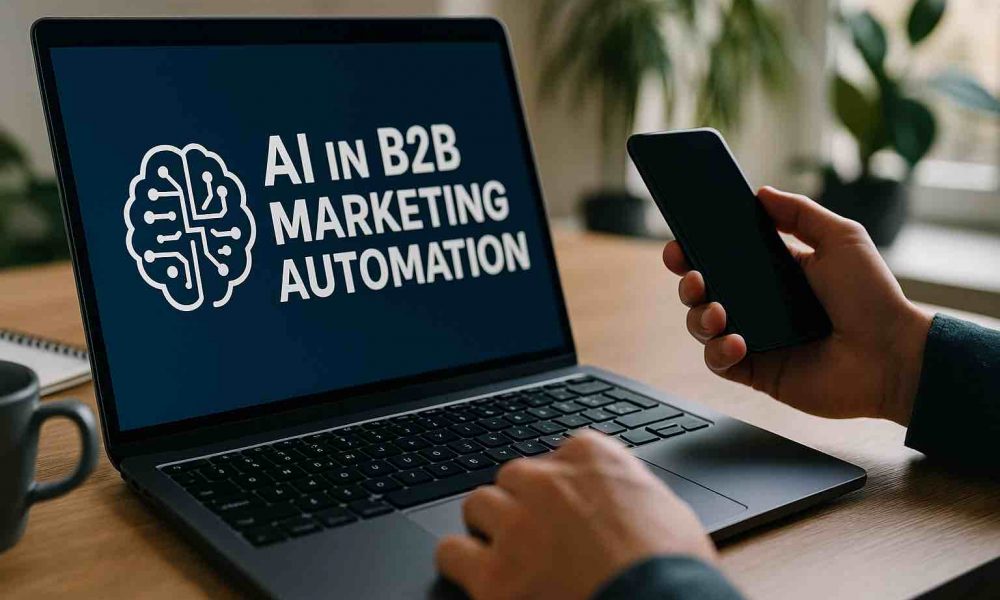Unlock Performance and Growth With AI Automation for B2B Firms
AI automation is changing the landscape for B2B firms. It enhances procedures and decreases dependence on human treatment. This shift enables services to make quicker, data-driven decisions. As organizations discover which processes to automate, they should likewise think about the right devices to execute. Challenges stay in adopting AI modern technology. The effects of these adjustments might form the future of numerous business in means yet to be fully comprehended.
Understanding AI Automation in the B2B Context
As organizations increasingly look for effectiveness, comprehending AI automation in the B2B context ends up being crucial. AI automation includes utilizing sophisticated modern technologies to enhance operations, reduce human treatment, and improve decision-making procedures. In the B2B landscape, this can manifest in various types, such as automating client service interactions, handling supply chain logistics, or optimizing marketing projects. Business can take advantage of AI to assess substantial datasets quickly, enabling them to recognize patterns and insights that educate critical selections. AI systems can incorporate seamlessly with existing technologies, providing a cohesive platform for handling organization features. This understanding prepares for companies to explore exactly how AI can transform their operations, improve performance, and ultimately foster sustainable development in an open market.
Trick Advantages of Applying AI Automation

Determining Processes Appropriate for Automation
How can B2B companies properly recognize processes suitable for automation? An organized strategy starts with drawing up existing workflows to identify recurring and time-consuming tasks. These jobs frequently consist of data entry, invoicing, and client follow-ups. Companies ought to evaluate the regularity and quantity of these processes, as high-frequency tasks provide the biggest possibility for performance gains. Furthermore, assessing the potential for mistake reduction and resource allocation can highlight areas ripe for automation. Involving staff members in conversations can likewise provide understandings right into which procedures prevent efficiency. Ultimately, business ought to consider the positioning of automation with their critical objectives, guaranteeing that the recognized procedures add to total service goals, eventually facilitating smoother operations and improved development.

Picking the Right AI Devices for Your Business
When B2B firms consider automating their processes, selecting the right AI tools comes to be crucial for accomplishing preferred outcomes. Business ought to begin by examining their special needs and objectives, guaranteeing placement with organization objectives. Assessing the assimilation, scalability, and versatility abilities of possible devices is vital, as these aspects determine long-term efficiency (Minarik AI). Organizations must also consider user-friendliness and the level of assistance supplied by vendors, as these elements can affect successful execution. Furthermore, evaluating client reviews and situation studies can supply understandings into how specific AI solutions execute in real-world circumstances. By thoroughly picking AI devices that fit their operational requirements, B2B firms can boost performance and drive development while lessening potential disruptions
Getting Rid Of Difficulties in AI Fostering
B2B companies usually experience substantial obstacles in embracing AI modern technologies, specifically problems associated with data top quality and resistance to change administration. Poor data high quality can prevent the effectiveness of AI systems, while employee unwillingness to accept brand-new processes can stall application efforts. Addressing these challenges is important for effective AI combination and optimizing its potential advantages.
Data Top Quality Issues
Assuring high data quality is important for the successful fostering of AI modern technologies in business-to-business settings. Imprecise, insufficient, or out-of-date information can seriously hinder AI initiatives, resulting in erroneous understandings and inadequate decision-making. Business commonly deal with challenges such as data silos, variances across different sources, and an absence of standardized data layouts. To conquer these problems, companies need to buy information cleansing, assimilation, and administration processes (Growth Systems For B2B). Applying robust data administration practices ensures that the information fed right into AI systems is pertinent and trustworthy. Furthermore, fostering a society of data high quality understanding among workers can improve information precision over time. By dealing with data high quality issues, B2B companies can launch the complete potential of AI automation, driving performance and development
Change Monitoring Resistance
Conquering adjustment administration resistance is necessary for the effective implementation of AI efforts within organizations. Staff members often show suspicion towards AI, being afraid job displacement or modifications to well-known process. To fight this, leadership has to foster a culture of openness and continuous discovering. Giving training and clear interaction concerning the benefits of AI can reduce concerns and build trust fund. Engaging workers in the shift procedure urges partnership and decreases resistance. Identifying adjustment champions within groups can help with smoother acceptance of AI technologies. As organizations navigate this improvement, resolving psychological and practical worries related to AI adoption ends up being crucial for making the most of the innovation's prospective and making certain a smooth integration right into existing procedures.
Gauging the Effect of AI Automation
Measuring the impact of AI automation in B2B business requires a clear understanding of vital performance indications (KPIs) that line up with business goals. Efficient data analysis strategies are essential for interpreting the outcomes, while robust ROI evaluation techniques help figure out the financial advantages of automation efforts. With each other, these elements offer a comprehensive structure for reviewing AI's contributions to organizational success.
Secret Efficiency Indicators
Trick performance signs (KPIs) function as vital tools for B2B business to analyze the performance of AI automation efforts. By developing clear metrics, companies can gauge improvements in functional efficiency, price decrease, and revenue development directly attributable to automation. Typical KPIs consist of cycle time reduction, error rates, consumer fulfillment scores, and staff member productivity degrees. These indications supply understandings right into how AI systems are enhancing processes and boosting general efficiency. Furthermore, tracking KPIs enables business to recognize locations for additional enhancement and to line up AI automation efforts with calculated organization goals. Ultimately, a well-defined framework of KPIs warranties that B2B business can quantitatively examine the impact of AI automation on their operations and drive constant development.
Data Analysis Strategies
Efficient information analysis methods play a crucial function in assessing the influence page of AI automation within B2B business. By utilizing analytical techniques, organizations can determine patterns and patterns in operational data, allowing them to evaluate the effectiveness obtains attained through automation. Methods such as regression analysis and time series forecasting provide insights into how AI-driven processes influence productivity and decision-making. Minarik AI. In addition, data visualization tools can successfully interact searchings for to stakeholders, facilitating notified calculated decisions. Equipment understanding algorithms can further improve evaluation by anticipating future results based upon historic information, supplying actionable understandings. Eventually, these techniques enable B2B business to determine success and enhance their AI automation initiatives, making certain alignment with company purposes and improving general efficiency
ROI Analysis Techniques
Reviewing the return on financial investment (ROI) of AI automation is vital for B2B firms seeking to comprehend the monetary effects of their technical efforts. Business can use various ROI analysis methods to gauge the performance of AI applications. One reliable strategy includes computing expense savings by contrasting functional expenditures prior to and after automation. Furthermore, measuring performance renovations through key performance indications (KPIs) helps quantify the advantages of AI. Consumer contentment metrics can likewise supply understandings into the impact of automation on solution high quality. To assure a thorough evaluation, business ought to think about both straight abstract benefits and financial returns, such as boosted decision-making capacities and affordable benefit. This diverse analysis enables B2B firms to make informed decisions regarding future investments in AI technology.
Future Patterns in AI Automation for B2B Business
What technologies lie in advance for AI automation in B2B companies? Emerging fads indicate a significant change towards enhanced information analytics capabilities, enabling services to make more informed choices (AI Automation For B2B). Anticipating analytics will come to be progressively necessary, permitting firms to prepare for market modifications and customer demands. In addition, the assimilation of AI with Web of Things (IoT) technology is expected to enhance procedures by offering real-time understandings and automation of procedures. Companies will certainly likewise concentrate on improving customer experiences through customized advertising and marketing driven by AI algorithms. Improvements in natural language handling will assist in much better interaction in between services and customers. As these fads advance, B2B firms should adjust to utilize AI automation successfully, making certain sustained development and competitive benefit
Regularly Asked Questions
What Industries Advantage one of the most From AI Automation in B2B?
Manufacturing, finance, healthcare, and logistics industries profit one of the most from AI automation in B2B. These markets take advantage of AI to maximize processes, boost decision-making, and enhance overall functional effectiveness, driving substantial development and innovation.
Exactly How Does AI Automation Influence Staff Member Roles and Responsibilities?
AI automation reshapes employee duties and duties by simplifying recurring jobs, making it possible for workers to concentrate on tactical initiatives. This shift fosters skill growth, boosts efficiency, and urges cooperation, inevitably driving business development and advancement.
What Prevail Misunderstandings Regarding AI Automation in B2B?
Usual mistaken beliefs about AI automation in B2B include anxieties of work loss, ideas that AI can fully change human judgment, and taking too lightly the importance of collaboration between AI systems and workers for ideal results. - B2B Growth Consulting
Just How Can Companies Make Sure Data Privacy With AI Automation?
Services can ensure information personal privacy with AI automation by executing durable file encryption protocols, sticking to regulative conformity, conducting normal audits, and training staff members on data dealing with techniques to reduce dangers and safeguard delicate details. (Growth Systems For B2B)
What Are the Expenses Connected With Applying AI Automation?
The costs associated with carrying out AI automation include software purchase, facilities upgrades, training personnel, continuous upkeep, and possible downtime throughout integration. In addition, business may sustain costs associated with information safety and conformity measures.
Determining the influence of AI automation in B2B firms requires a clear understanding of essential efficiency signs (KPIs) that straighten with organization purposes. Trick performance indicators (KPIs) offer as essential tools for B2B firms to evaluate the effectiveness of AI automation initiatives. Effective information evaluation techniques play a crucial role in examining the influence of AI automation within B2B companies. Assessing the return on financial investment (ROI) of AI automation is necessary for B2B firms looking for to comprehend the financial effects of their technical efforts. What developments exist ahead for AI automation in B2B companies?